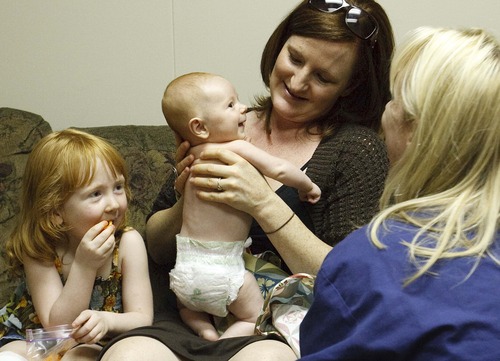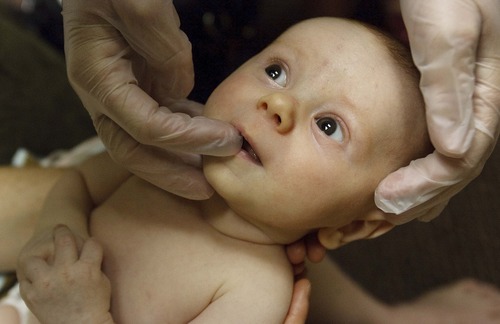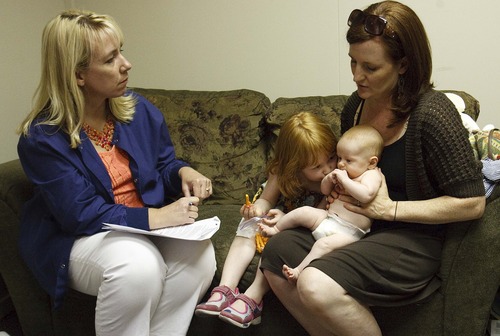This is an archived article that was published on sltrib.com in 2013, and information in the article may be outdated. It is provided only for personal research purposes and may not be reprinted.
Sleep-deprived, sore-breasted moms of fussy newborns don't want to be told their nursing difficulties are normal, or that they'll resolve in time.
"I needed help," said Dia Fuller, who shelled out $60 last week for an hour of hands-on guidance from a lactation consultant.
The visit should have been covered by her health insurer. Last year, the federal health reform law mandated coverage of breast-feeding supports and supplies, including counseling and all the collateral equipment, such as breast pumps, which can range in price from $150 to $1,400.
Insurance companies, however, vary in their interpretation of the new rules. And questions over who may be paid for counseling, and which equipment should be covered, are sowing confusion for providers and patients.
"Lactation care is such a small part of the Affordable Care Act that insurance companies aren't sure what to do with us," said Karin Hardman, an International Board Certified Lactation Consultant (IBCLC) in Ogden.
Science charting the seemingly endless health benefits of breast-feeding, for both mom and baby, have driven a nursing boom in the U.S., and a steady stream of customers to experts such as Hardman, who has been in private practice for nearly two years.
Retail shops, such as the Lactation Station in Holladay, have also done brisk business selling breast-feeding appliances and accoutrements: nursing bras and pads, Hooter Hiders, baby slings, soothing creams and gels, pumps and tube-feeding systems.
Insurance coverage should be good news for the industry, guaranteeing a source of revenue for years to come. The United States Breastfeeding Committee, a nonprofit that sets nursing standards, recommends insurers pay for up to six visits with a lactation consultant; one electric pump plus disposable parts; a hospital-grade pump rental for moms who are separated from their infants due to prematurity, adoption or medical problems; and, in some cases, supplemental lactation aids such as nipple shields and breast shells.
But solo practitioner such as Hardman, and shop owners such as Carrie Warburton at the Lactation Station, say unless they get on an insurance plan's provider rolls, they can't bill the insurer. Such contracts are typically reserved for licensed health professionals, such as nurses and doctors, and large medical device distributors.
"Someone is making good money off the law," said Warburton. "But it isn't us."
Warburton says she doesn't believe the health law will hurt her 24-year-old shop, but said it's not likely to help either.
"Our pump sales have gone down quite a bit, but rentals have gone up because a lot of the pumps covered by insurance aren't as high quality," she said.
Some insurers only cover manual pumps, which aren't practical for working moms, she said. Others cover electric pumps, but only one brand, and not hospital-grade machines that are built to last.
What's more, she said, the reliable medical-equipment companies often charge twice the retail price. They can't give you advice on how to use a breast pump and they don't always keep them in stock.
"You've got women having to wait several weeks, which is crazy," Warburton said. "If you need to pump, you need to pump right away."
The law poses a bigger problem for certified lactation consultants who are struggling to get added to insurer panels.
"When you try to bill insurers, [they] say, 'You're not on our provider list.' And when you ask to apply to be in-network, they say their system isn't set up to add lactation consultants," said Julie Johnson, an IBCLC in South Jordan.
Intermountain Healthcare's insurance arm, SelectHealth only pays "qualified professionals"— generally nurses — for lactation care provided at one of its hospitals or clinics.
"It's not in their best interest to have someone outside the hospital providing those services, even though it's not always in a nurse's or doctor's scope of practice," said Hardman. "A registered nurse who takes one 20-hour class on nursing isn't the same as certified lactation consultant. I have to have 75 hours of continuing education every five years."
Hardman said the Utah Breastfeeding Coalition is working with lawmakers to get IBCLC's licensed in Utah.
She was able to sign on with AETNA, but said, "I'm still experiencing payment delays when it comes to billing."
Johnson hired a billing specialist to cut through the red tape, and wonders if it's worth the hassle, which she could avoid by working under an obstetrician, pediatrician or other licensed health provider.
But she likes the flexibility of being able to make house calls and still has cash-paying customers such as Fuller.
"My pediatrician isn't a female and doesn't know enough about all of this," said Fuller, who paid Johnson with money from her health savings account.
No one, not doctors or nurses at the hospital, could discern why 12-month-old Ellis couldn't "latch."
But Johnson immediately diagnosed tongue-tie, an unusually tight band of tissue tethering his tongue to the floor of his mouth and restricting its range of motion.
Fuller had her pediatrician snip the tie, a short outpatient procedure that some doctors won't do because they believe the baby will grow out of it.
Ellis is now sucking like a champ and gaining weight and Fuller reports no more blisters or shooting pain.
"Now it's like, 'Oh, it doesn't hurt,'" she said. "I don't understand why insurers won't pay for this. It's so shortsighted when the health benefits are so clear."
Twitter: @kirstendstewart —
Breastfeeding by the numbers
• Of infants born in 2010, nearly half were breastfeeding at six months, according to a new report by the U.S. Centers for Disease Control (CDC). That's up from 35 percent in 2000.
• Fewer women, about 27 percent, stick with it for the recommended 12 months.
• Only about 22.5 percent of Utah infants are exclusively breastfed at six months.
Sources • Utah Department of Health and U.S. Centers for Disease Control and Prevention —
Health benefits of breastfeeding
• Breastfeeding has been shown to reduce an infant's risk for respiratory illnesses, asthma, obesity, diabetes, lymphoma and leukemia.
• Studies also show it benefits the mother, reducing her risk for pre-menopausal breast and ovarian cancer, adult-onset diabetes and heart disease.
Sources • The United States Breastfeeding Committee







